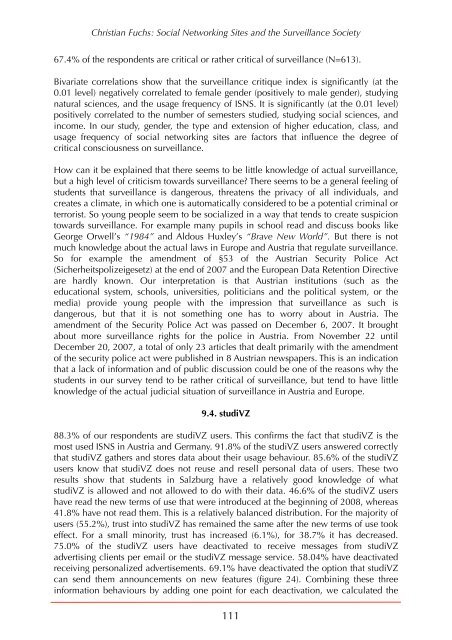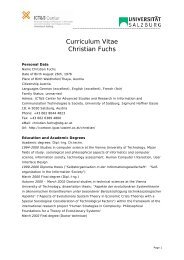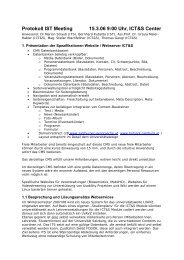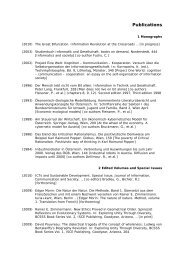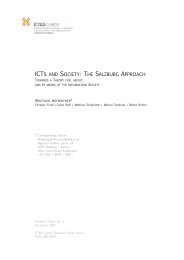CHRISTIAN FUCHS - ICT&S - Universität Salzburg
CHRISTIAN FUCHS - ICT&S - Universität Salzburg
CHRISTIAN FUCHS - ICT&S - Universität Salzburg
Create successful ePaper yourself
Turn your PDF publications into a flip-book with our unique Google optimized e-Paper software.
Christian Fuchs: Social Networking Sites and the Surveillance Society67.4% of the respondents are critical or rather critical of surveillance (N=613).Bivariate correlations show that the surveillance critique index is significantly (at the0.01 level) negatively correlated to female gender (positively to male gender), studyingnatural sciences, and the usage frequency of ISNS. It is significantly (at the 0.01 level)positively correlated to the number of semesters studied, studying social sciences, andincome. In our study, gender, the type and extension of higher education, class, andusage frequency of social networking sites are factors that influence the degree ofcritical consciousness on surveillance.How can it be explained that there seems to be little knowledge of actual surveillance,but a high level of criticism towards surveillance? There seems to be a general feeling ofstudents that surveillance is dangerous, threatens the privacy of all individuals, andcreates a climate, in which one is automatically considered to be a potential criminal orterrorist. So young people seem to be socialized in a way that tends to create suspiciontowards surveillance. For example many pupils in school read and discuss books likeGeorge Orwell’s “1984” and Aldous Huxley’s “Brave New World”. But there is notmuch knowledge about the actual laws in Europe and Austria that regulate surveillance.So for example the amendment of §53 of the Austrian Security Police Act(Sicherheitspolizeigesetz) at the end of 2007 and the European Data Retention Directiveare hardly known. Our interpretation is that Austrian institutions (such as theeducational system, schools, universities, politicians and the political system, or themedia) provide young people with the impression that surveillance as such isdangerous, but that it is not something one has to worry about in Austria. Theamendment of the Security Police Act was passed on December 6, 2007. It broughtabout more surveillance rights for the police in Austria. From November 22 untilDecember 20, 2007, a total of only 23 articles that dealt primarily with the amendmentof the security police act were published in 8 Austrian newspapers. This is an indicationthat a lack of information and of public discussion could be one of the reasons why thestudents in our survey tend to be rather critical of surveillance, but tend to have littleknowledge of the actual judicial situation of surveillance in Austria and Europe.9.4. studiVZ88.3% of our respondents are studiVZ users. This confirms the fact that studiVZ is themost used ISNS in Austria and Germany. 91.8% of the studiVZ users answered correctlythat studiVZ gathers and stores data about their usage behaviour. 85.6% of the studiVZusers know that studiVZ does not reuse and resell personal data of users. These tworesults show that students in <strong>Salzburg</strong> have a relatively good knowledge of whatstudiVZ is allowed and not allowed to do with their data. 46.6% of the studiVZ usershave read the new terms of use that were introduced at the beginning of 2008, whereas41.8% have not read them. This is a relatively balanced distribution. For the majority ofusers (55.2%), trust into studiVZ has remained the same after the new terms of use tookeffect. For a small minority, trust has increased (6.1%), for 38.7% it has decreased.75.0% of the studiVZ users have deactivated to receive messages from studiVZadvertising clients per email or the studiVZ message service. 58.04% have deactivatedreceiving personalized advertisements. 69.1% have deactivated the option that studiVZcan send them announcements on new features (figure 24). Combining these threeinformation behaviours by adding one point for each deactivation, we calculated the111


